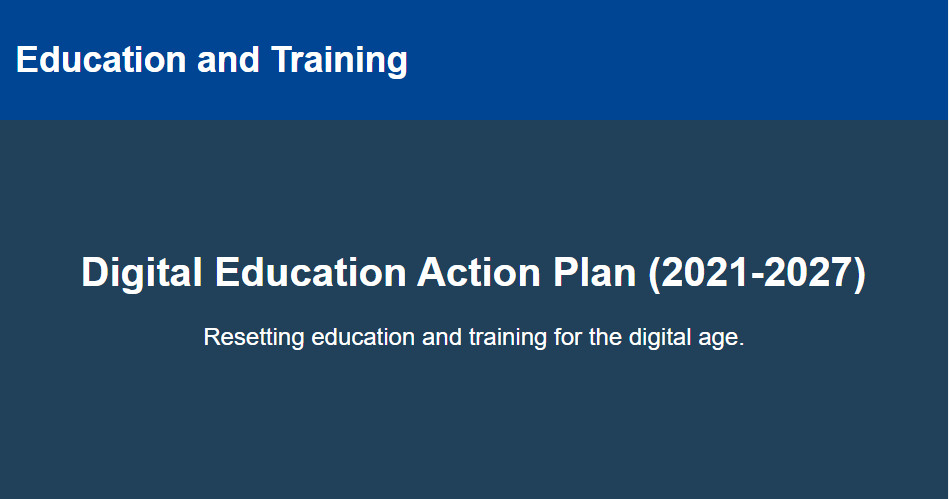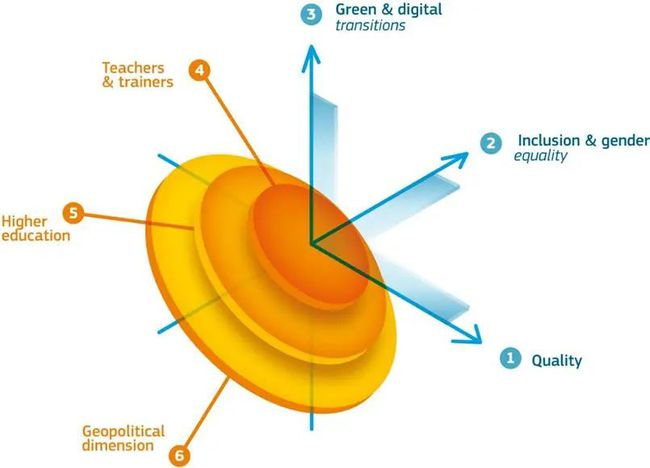为从新冠肺炎疫情的危机中充分吸取教训,建立高效的数字教育生态系统,促使欧洲教育和培训系统更加契合数字时代,2020年9月30日,欧盟委员会发布《数字教育行动计划(2021-2027)》(Digital Education Action Plan (2021-2027))。
《数字教育计划(2021-2027)》概述了如何通过合作进一步丰富欧盟成员国教育体系的质量、包容性、数字化和绿色维度,以及成员国如何携手打造一个基于学习者和教师在整个欧洲大陆自由学习和工作,以及欧洲和其他地区机构之间自由联系的欧洲教育区。
下文为《数字教育行动计划(2021-2027)》内容(中英文对照版):
新《数字教育行动计划》有两项战略重点
The new Action Plan has two strategic priorities
Fostering the development of a high-performing digital education ecosystem
欧盟将采取如下行动:
1、与成员国启动战略对话,以便在2022年之前就数字化教育成功的有利因素为理事会提出可能的建议;
Launch a strategic dialogue with European Union (EU) Member States to prepare a proposal for a Council Recommendation on the enabling factors for successful digital education by 2022
2、从疫情中吸取教训,到2021年底就中小学在线和远程学习提出建议。
Propose a Council Recommendation on online and distance learning for primary and secondary education. Its focus should be an EU-wide common understanding of how to make distance, online and blended learning effective, inclusive and engaging by the end of 2021
3、建立一个基于欧洲文化和创意多样性的欧洲数字教育内容框架。另外,启动针对欧洲交流平台的可行性研究,用于共享及认证在线资源,连接现有教育平台。
Develop a European Digital Education Content Framework that will build on European cultural and creative diversity and launch a feasibility study on a possible European exchange platform to share certified online resources and connect with existing education platforms
4、支持校园内的千兆互联,开展“为学校连通”(Connectivity4Schools)意识提升行动,鼓励成员国充分利用欧盟在互联网接入、购买数字设备、电子学习应用和平台等方面的支持。
Support the Gigabit connectivity of schools, as well as connectivity in schools, carry out Connectivity4Schools awareness on funding opportunities and encourage Member States to make the most of EU support with regard to internet access, the purchase of digital equipment, e-learning applications and platforms
5、通过伊拉斯谟合作项目,支持各级教育和培训的数字化转型计划。通过伊拉斯谟教师学院普及数字教学法和教师使用数字工具的专业知识,并为教师推出在线自我评估系统——SELFIE for Teacher(教师通过创新教育科技促进高效学习的自我评估)
Support digital transformation plans at all levels of education and training through Erasmus cooperation projects. Support digital pedagogy and expertise in the use of digital tools for teachers through Erasmus Teacher Academies and launch an online self-assessment tool for teachers - SELFIE (Self-reflection on Effective Learning by Fostering the use of Innovative Educational technologies) for Teachers
6、为教学开发人工智能(AI)和数字使用指南,提供教学支持,并支持Horizon Europe在这一领域的研究和创新。
Develop ethical guidelines on artificial intelligence (AI) and data usage in teaching and learning for educators and support Horizon Europe research and innovation in this area
Enhancing digital skills and competences for the digital transformation
要求各国从小培养学生的基本数字技能和数字素养(包括打击虚假信息的能力)、对数据密集型技术(如人工智能)等高级数字技能有更深入的了解,以及要确保女性在数字研究和职业中享有平等权利。同时,欧盟委员会也会为教师和教育人员进行数字扫盲的培训。
欧盟将采取如下行动:
1、通过教育和培训来发展教师和教育工作者关于促进数码素养的基本准则和处理虚假信息。与社会、欧洲技术公司、运营商、广播公司、记者、媒体扫盲专家组、欧洲数字媒体观察站、国家当局、家长、学生和青年合作。
Develop common guidelines for teachers and educational staff to foster digital literacy and tackle disinformation through education and training. Work with civil society, European technology companies and carriers, broadcasters, journalists, the Media Literacy Expert group, the European Digital Media Observatory, national authorities, parents, students and young people.
2、更新欧洲数字能力框架,包括人工智能和数据相关技能,并支持学校以及其他培训组织开发人工智能学习资源。
Update the European Digital Competence Framework to include AI and data-related skills and support development of AI learning resources for schools, vocational education and training (VET) organisations, and other training providers
3、开发一个被欧洲各国政府、雇主和其他机构认可和接受的欧洲数字技能证书(EDSC)。
Create a European Digital Skills Certificate (EDSC) that is recognised and accepted by governments, employers and others across Europe
4、就改善教育与培训中数字技能的提供提出建议,包括欧盟投资与教师专业发展,分享高质量计算机教育教学方法的最优实践,并与业界合作合作识别和更新技能需求。
Propose a Council recommendation on improving the provision of digital skills in education and training. This would include using EU tools to invest in teacher professional development, sharing best practices on instructional methods in high-quality computing education and working with industry to identify and update skills needs as they emerge
5、鼓励更多的人参与国际计算机与信息素养研究(ICILS),改进监测和支持跨国收集学生数字技能数据,以更好地了解差距,并加强针对这些差距采取行动的证据基础。这将包括引入欧盟的学生数字能力目标:到2030将计算机和信息素养表现不佳的13-14岁的学生比例降低到15%以下。
Encourage more participation in the International Computer and Information Literacy Study (ICILS), which gathers cross-national data on student digital skills and introduce an EU target for student digital competence of under 15% by 2030 for 13-14 year old students who underperform in computer and information literacy
6、通过有针对性的措施,鼓励高级数字技能开发,包括扩大数字机会培训名额,将其扩大到职业教育学习者和学徒,并为教师、培训人员和学校、职业教育、成人和高等教育的其他教育工作人员提供专业发展机会。
Target advanced digital skills development though steps such as extending the Digital Opportunity traineeships to VET learners and apprentices, and offer professional development opportunities for teachers, trainers and other educational staff
7、鼓励女性与欧洲创新与技术研究所合作参与STEM(科学、技术、工程和数学)项目,并支持欧洲STEM联盟以“STEAM(科学、技术、工程、艺术和数学)”项目为基础,开发新的工程和信息通信技术的高等教育课程,吸引女性从事STEM行业
Encourage women’s participation in STEM (science, technology, engineering and mathematics) with theEuropean Institute of Innovation and Technology (EIT) and support the EU STEM Coalition to develop higher education curricula which attracts women to engineering and ICT based on the ‘STEAM’ (science, technology, engineering, arts and mathematics) approach
此外、欧盟就新的《数字教育行动计划》开展了公众公开咨询。根据咨询结果,近60%的受访者在疫情前没有使用过远程和在线学习;95%的人认为新冠疫情标志着数字技术在教育和培训中应用的转折点;受访者还表示在线学习资源和内容需要更具相关性、互动性和易用性;超过60%的受访者认为他们在疫情期间提高了自己的数字技能,超过50%的受访者计划采取行动进一步提高自己的数字技能。
加强欧盟数字教育合作与交流
Strengthening cooperation and exchange in digital education at EU level
欧盟可在以下方面发挥积极作用:
1. Identifying, sharing and scaling up good practices
2. Supporting Member States and the education and training sector with tools, frameworks, guidance, technical expertise and research
3. Fostering cooperation between all stakeholders
欧盟通过创建新欧洲数字教育中心可以:
1. Link national and regional digital education initiatives and actors
2. Support cross-sector collaboration and new models for exchange of digital learning content, addressing issues such as common standards, interoperability, accessibility and quality-assurance.
该中心作为欧洲数字教育的“智囊团”,旨在为支持政策、实践与数字教育的发展做出贡献,并通过数字教育黑客马拉松(Digital Education Hackathon)等竞赛促进用户为数字时代的教育挑战创造解决方案。
The Hub will serve as a think-tank, supporting the development of policy and practice and monitor the development of digital education in Europe, including the implementation of the new Digital Education Action Plan. The Hub will also support user-driven innovation and engagement through the Digital Education Hackathon.
表达1:We can't stand each other.
翻译:我们不能容忍对方。
“stand”作动词时,可以表示“容忍,忍受”,常用于否定句与疑问句。“我们不能容忍对方”,也即意味着关系并不好。
表达2:We are not friends at all.
翻译:我们可不是朋友。
“at all”表示“全然,一点,根本,究竟”的意思,多用于否定句、条件句、疑问句的句末,有“加强”的意味。
“我们不是朋友”就算了,还要用上“根本”,多少有强调,意欲与其撇清关系的嫌疑,因此也可表示“关系差”。
表达3:We don't like each other.
翻译:我们不喜欢彼此。
这应该是最简单、最直接的表达,直接明了地说出我们俩之间的状态——“彼此互不喜欢”,也就是“关系差”。
表达4:We drive each other insane.
翻译:我们让彼此都很抓狂。
“insane”作形容词,表示“精神失常的,精神错乱的,疯狂的,危险的”,两人在一起的状态是失控的,让人抓狂的,甚至是互相仇恨的,自然也就是“关系差”的表现。
表达5:We are not compatible.
翻译:我们水火不容。
“compatible”作形容词,有“关系好的,和睦相处的”的意思,在前面加一个“not”,表示否定,即我们的关系不好,我们相处不和谐。




















